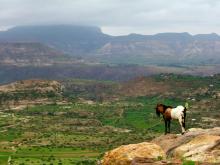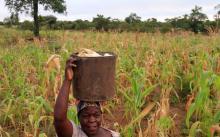On Friday, the African Pavilion at COP21 was officially opened aimed at union and solidarity in the face of climate change. The President of Benin, Yayi Boni, spoke at the opening; “Africa did not come here (COP21) to beg for money or assistance but to bring about commitment of all concerned to Africa’s adaptation needs.”
The Paris Agreement: What next for Africa?
Introduction
The sixth Climate Change and Development in Africa (CCDA–VI) Conference is organized under the auspices of the Climate Change and Development in Africa (ClimDev-Africa) programme.

The main theme of this year’s conference is ‘The Paris Climate Agreement: What Next for Africa?’ It builds on CCDA-V whose focus was on revisiting Article 2 of the UNFCCC, with a theme that dwelled on “Africa, Climate Change and Sustainable Development: What is at stake at Paris and beyond”. Reviewing the Paris Agreement, thus, allows for a contextual analysis of what was at stake for Africa prior to COP21 and what the agreement offers, thereby contributing to strategic orientation for African countries in moving forward with the implementation of the agreement.
As a forum tailored to facilitate science-policy dialogue and provide a marketplace for innovative solutions that integrates climate change into development processes, it is important to engage and embrace the Paris Climate Agreement within the framework of Africa’s development aspirations as underscored in Agenda 2063 that embodies the vision of the ‘Africa we want’ and Agenda 2030 on Sustainable Development that set global targets with a vision of ‘leaving no one behind’.
Objective
The overall objective of CCDA-VI is to understand the implementation implications, nuances, challenges and opportunities of the Paris Agreement for Africa in the context of the continent’s development priorities.
Specific objectives
- Examine the implications of the Paris Agreement on Africa’s future economic growth and sustainable development agenda
- Deepen understanding of the nuances in the decisions of COP21, particularly with regard to means of implementation (capacity, finance and technology transfer), as well the domestication of the agreement in Africa in alignment with national development priorities of African countries
- Identify strategies for implementing the agreement especially through pan-African initiatives and institutions, and employing public-private partnerships and the engagement of state and non-state actors
- Provide a solution space for innovation, and a platform for dialogue between state and non-state actors,
- Facilitate networking between climate and development stakeholders
- Provide a platform to raise awareness on the importance of climate information service (CIS) and enhance its uptake in development policy processes.
- Explore new and evolving challenges in Africa related to climate change
Who is Expected to Attend
CCDA achieves its objective by bringing together researchers, policy makers and development practitioners, climate scientists, user groups and other stakeholders to understand contemporary climate change issues and contribute towards the identification and elaboration of appropriate responses, including providing support for policy responses, mitigation, adaptation and technological innovations, among others. Previous CCDA forums have discussed issues of climate science and policy, and emphasized the need to use climate science and climate information to support the development process.
Format
CCDA-VI will employ three different approaches over four days in reaching out and convening the wide range of constituencies and actors engaged in climate change and development in Africa. On the first day, interest groups and climate change intervention partners will hold pre-events. On the second day, a high level panel discussion will formally kick-off the main conference with a deliberation on the main theme, followed by plenary sessions on the event sub-themes. The third day will be dedicated to discussions, exhibitions and demonstrations on climate information services in Africa. Lastly, the fourth day will constitute plenaries and parallel sessions on climate research and innovations.
Latest News
Recent Documents
| WP27 Impact on Household Welfare | English |
| WP26 Synthesis Climate Change and Agriculture Production | English |
| WP25 Scoping Study Uganda | English |
- CCDA-VI: The Paris Agreement: What next for Africa?
- CCDA-V: Africa, Climate Change and Sustainable Development: What is at Stake at Paris and Beyond?
- CCDA-IV: Africa Can Feed Africa Now: Translating Climate Knowledge into Action.
- CCDA-III: Africa on the Rise: Can the Opportunities from Climate Change Spring the Continent to Transformative Development?
- CCDA-II: Advancing Knowledge, Policy and Practice on Climate Change and Development.
- CCDA-I: Development First:Addressing Climate change in Africa.
In The News
|
|
|
Martha Mafa, a subsistence farmer, carries a bucket of maize on her head in Chivi, about 378km (235 miles) south-east of the capital Harare, April 1, 2012. REUTERS/Philimon Bulawayo |




